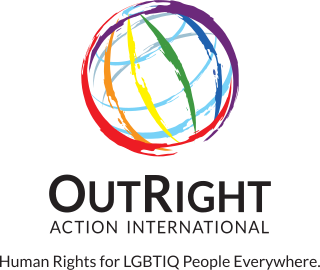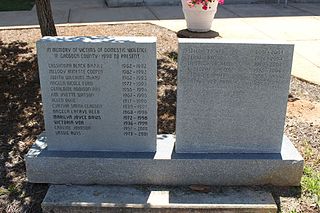
The Violence Against Women Act of 1994 (VAWA) is a United States federal law signed by President Bill Clinton on September 13, 1994. The Act provided $1.6 billion toward investigation and prosecution of violent crimes against women, imposed automatic and mandatory restitution on those convicted, and allowed civil redress when prosecutors chose to not prosecute cases. The Act also established the Office on Violence Against Women within the U.S. Department of Justice.

A women's shelter, also known as a women's refuge and battered women's shelter, is a place of temporary protection and support for women escaping domestic violence and intimate partner violence of all forms. The term is also frequently used to describe a location for the same purpose that is open to people of all genders at risk.

Violence against women (VAW), also known as gender-based violence and sexual and gender-based violence (SGBV), are violent acts primarily or exclusively committed by men or boys against women or girls. Such violence is often considered a form of hate crime, committed against women or girls specifically because they are female, and can take many forms.

OutRight International (OutRight) is a LGBTIQ human rights non-governmental organization that addresses human rights violations and abuses against lesbian, gay, bisexual, transgender and intersex people. OutRight International documents human rights discrimination and abuses based on their sexual orientation, gender identity, gender expression and sex characteristics in partnership with activists, advocates, media, NGOs and allies on a local, regional, national and international level. OutRight International holds consultative status with ECOSOC.

The Protection of Women from Domestic Violence Act 2005 is an Act of the Parliament of India enacted to protect women from domestic violence. It was brought into force by the Indian government and Ministry of Women and Child Development on 26 October 2006. The Act provides a definition of "domestic violence" for the first time in Indian law, with this definition being broad and including not only physical violence, but also other forms of violence such as emotional, verbal, sexual and psychological abuse. It is a civil law meant primarily for protection orders, rather than criminal enforcement.
Intimate partner violence (IPV) is domestic violence by a current or former spouse or partner in an intimate relationship against the other spouse or partner. IPV can take a number of forms, including physical, verbal, emotional, economic and sexual abuse. The World Health Organization (WHO) defines IPV as "any behavior within an intimate relationship that causes physical, psychological or sexual harm to those in the relationship, including acts of physical aggression, sexual coercion, psychological abuse and controlling behaviors." IPV is sometimes referred to simply as battery, or as spouse or partner abuse.
Women's Aid Organisation (WAO) is a Malaysian non-governmental organisation that fights for women's rights and specifically against violence against women. It was founded in 1982 and continues to play a leading role in the Malaysian women's rights movement working within the fields of advocacy, public education as well as law and policy reforms.

The National Network to End Domestic Violence(NNEDV) is a 501(c)(3) not-for-profit organization founded in 1990, based in the District of Columbia. It is a network of state and territorial domestic violence coalitions, representing over 2,000 member organizations nationwide. The National Network to End Domestic Violence works to address the many aspects of domestic violence.

The Norwegian Association for Women's Rights is Norway's oldest and preeminent women's and girls' rights organization and works "to promote gender equality and all women's and girls' human rights through political and legal reform within the framework of liberal democracy." Founded in 1884, NKF is Norway's oldest political organization after the Liberal Party. NKF stands for an inclusive, intersectional and progressive mainstream liberal feminism and has always been open to everyone regardless of gender. Headquartered at Majorstuen, Oslo, NKF consists of a national-level association as well as regional chapters based in the larger cities, and is led by a national executive board. NKF has had a central role in the adoption of all major gender equality legislation and reforms since 1884.

Domestic violence is violence or other abuse that occurs in a domestic setting, such as in a marriage or cohabitation. Domestic violence is often used as a synonym for intimate partner violence, which is committed by one of the people in an intimate relationship against the other person, and can take place in relationships or between former spouses or partners. In its broadest sense, domestic violence also involves violence against children, parents, or the elderly. It can assume multiple forms, including physical, verbal, emotional, economic, religious, reproductive, or sexual abuse. It can range from subtle, coercive forms to marital rape and other violent physical abuse, such as choking, beating, female genital mutilation, and acid throwing that may result in disfigurement or death, and includes the use of technology to harass, control, monitor, stalk or hack. Domestic murder includes stoning, bride burning, honor killing, and dowry death, which sometimes involves non-cohabitating family members. In 2015, the United Kingdom's Home Office widened the definition of domestic violence to include coercive control.
The ManKind Initiative is a domestic violence charity based in the United Kingdom and is at the forefront of providing support for male victims of domestic abuse and violence. Since becoming a charity in 2001, it has provided a helpline, training and support for statutory agencies and campaigns to ensure that equal recognition is given to male victims in the same way that recognition is given to female victims of domestic abuse. It is one of only a few charities in the country to help male victims.

Domestic violence in United States is a form of violence that occurs within a domestic relationship. Although domestic violence often occurs between partners in the context of an intimate relationship, it may also describe other household violence, such as violence against a child, by a child against a parent or violence between siblings in the same household. It is recognized as an important social problem by governmental and non-governmental agencies, and various Violence Against Women Acts have been passed by the US Congress in an attempt to stem this tide.
The following outline is provided as an overview of and topical guide to domestic violence:

The management of domestic violence deals with the treatment of victims of domestic violence and preventing repetitions of such violence. The response to domestic violence in Western countries is typically a combined effort between law enforcement, social services, and health care. The role of each has evolved as domestic violence has been brought more into public view.
The Norwegian Women's Lobby is a feminist policy and advocacy organization in Norway, and is described as the country's "main, national, umbrella organization" for women's rights. NWL is inclusive, promotes intersectional feminism and "works to represent the interests of all those who identify as women and girls." The implementation of the CEDAW treaty is a major focus for NKL, and it works to enhance the implementation, visibility and relevance of CEDAW within politics and society. It states that it "brings together both the key women’s organisations and the leading experts on women’s rights in Norway" and that it has a focus on being a "cooperation partner for the government [and] to contribute to the representation of the Norwegian women's movement in international forums." NWL has stated that "NWL understands discrimination against girls and women in an intersectional perspective and is against, among other things, racism, homophobia, transphobia and ableism."
Domestic violence in Kenya constitutes any harmful behavior against a family member or partner, including rape, assault, physical abuse, and forced prostitution. Domestic violence in Kenya reflects worldwide statistics in that women are the overwhelming majority of victims. Over 40% of married women in Kenya have reported being victims of either domestic violence or sexual abuse. Worldwide, over 30% of "ever-partnered women" aged 15 and older have experienced physical or sexual partner violence. The distinct factors and causes of this high percentage have often not been studied due to lack of data.

Tor-Aksel Busch is a Norwegian lawyer and government official. He served as Director of Public Prosecutions from 1997 to 2019.

Amid the COVID-19 pandemic many countries have reported an increase in domestic violence and intimate partner violence. United Nations Secretary-General António Guterres, noting the "horrifying global surge", has called for a domestic violence "ceasefire". UN Women stated that COVID-19 created "conditions for abuse that are ideal for abusers because it forced people into lockdown" thus causing a "shadow pandemic" that exacerbated preexisting issues with domestic violence globally.

Rettighetsprisen is an award that is presented by Krisesentersekretariatet, the main domestic abuse organization in Norway, to an individual or organization that has distinguished themselves or itself in the work to "prevent gender-based violence and fatal violence in close relationships." It was first awarded to Norway's Director of Public Prosecutions Tor-Aksel Busch in 2014.
Solveig Karin Bø Vatnar is a Norwegian psychologist and violence researcher. She is a principal scientist and professor at Oslo University Hospital's center for security, prison and forensic psychiatry, and researches homicide perpetrated by intimate partners and family members. She has been a member of several royal commissions, i.e. government-appointed expert commissions.











